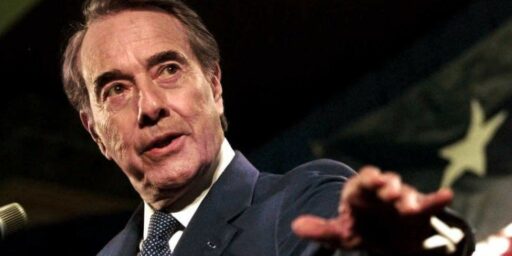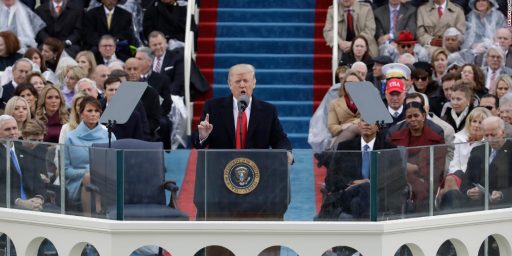POLL NUMBERS
David Winston has an interesting piece on presidential polling in today’s Roll Call.*
Not surprisingly, right after the Sept. 11, 2001, attacks, Bush̢۪s job approval ratings spiked to historic levels. Many media surveys showed that 90 percent or more of Americans approved of the job he was doing as president. It was a remarkable response; and, even more remarkably, Bush was able to sustain an 80 percent job approval for another six months despite a sagging economy and war in Afghanistan. There is no question that there was a fundamental, positive shift in how people viewed this president during that difficult time.
Certainly true. I’m not sure I’d say “despite . . . war in Afghanistan,” since that action against the direct perpetrators of the 9/11 attacks was hugely popular.
Bush’s poll numbers have moved to a more realistic level. This is exactly what Bush’s pollster, Matthew Dowd, predicted in a memo written at the height of Bush’s job approval. In the past two weeks, a crescendo of voices on cable and at Democratic presidential events have concluded that because his job approval has “dramatically dropped†to the mid-50s, Bush is in deep trouble. . . . Perhaps the easiest way to get some perspective on Bush’s job approval, however, is to compare his numbers to President Bill Clinton’s during roughly the same time frame — the first 32 months in office. Using Bush’s job approval numbers in major media surveys for just August, we find he averaged a 56 percent approve/38 percent disapprove. Contrast those numbers with Clinton’s in August 1995, his third year in office, and we see Clinton’s job approval average was 46 percent approve/43 percent disapprove.
Now for some context. Despite being 10 points lower than where Bush is today, 14 months after getting his 46 percent job approval, Clinton went on to crush former Sen. Bob Dole (R-Kan.) in the 1996 presidential election. Even more interesting, Bush̢۪s 56 percent average job approval is exactly the same as Clinton̢۪s in the last four months of the 1996 campaign. From August to November 1996, Clinton̢۪s monthly average ranged between 54 percent and 58 percent. Simply put, if Bush̢۪s job approval remains at this point or even slightly lower, he will face the eventual Democratic nominee at roughly the same political strength as Clinton when he easily beat Dole.
Here̢۪s another way to look at the numbers. During the entire 32 months of Bush̢۪s presidency, in all the public media polls (at least that I have been able to find), he has been at 55 percent or higher in 92 percent of the surveys. In contrast, during the same time frame, Clinton was at those levels in only 13 percent of the surveys. In fact, more people disapproved of Clinton̢۪s performance on the job than approved in slightly more than one out of every three polls (35 percent), and this was pre-Monica. Comparing the two men̢۪s numbers at the same point in their terms, there is simply no contest. Bush clearly has far greater support from the American public.
It̢۪s easy to forget that Clinton didn̢۪t effectively stay above 50 percent job approval until the beginning of February 1996. For surveys in January 1996, the average of media polls for Clinton was a job approval-disapproval of 49 percent-43 percent.
To be fair, though, several things that helped Clinton are unlikely to exist this time:
Still, these numbers put things into perspective. Approval ratings in the 50s, especially during the dog days of summer, aren’t anything to get too concerned about.
*I’ve apparently landed on some RNC listserv that I didn’t intentionally sign up for. I’ll likely block it soon, as they’ve sent me some junk, but this is a legit news story.






My guess is that his numbers will actually go up some, as we move into a period where he will be “doing something” rather than being “on vacation”–plus, the economy is likely to improve.
Well, points for doing something are always given – assuming the action doesn’t make things worse. Considering he’s got a huge hole to climb out of, it’s going to be interesting to see what Rove comes up with.
—